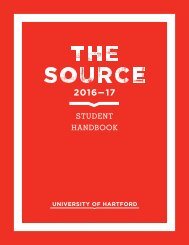advising
Create successful ePaper yourself
Turn your PDF publications into a flip-book with our unique Google optimized e-Paper software.
ADVISING HANDBOOK FOR FIRST-YEAR STUDENTS<br />
HE 112 Modern Health Concepts [3]<br />
A conceptual approach to the mental, emotional, social, and<br />
physical aspects of personal health in modern living. Emphasis is on<br />
knowledge and attitudes necessary to live more effectively.<br />
HS 140 Introduction to the Health Professions I [2]<br />
An introductory course to help first-year students develop an<br />
awareness of academic and social opportunities at the University,<br />
and to develop an awareness of the health-care system. This course<br />
incorporates an overview of health-care career opportunities, current<br />
issues within the field of health care, and the <strong>advising</strong> role of<br />
the faculty.<br />
HS 141 Introduction to the Health Professions II [2]<br />
A continuation of HS 140, this course examines additional<br />
issues related to the health-care system and to individual career<br />
opportunities.<br />
English<br />
Students in Education, Nursing and Health Professions are required<br />
to take both WRT 110 (Academic Writing I) and WRT 111<br />
(Academic Writing II). You are eligible to enroll in WRT 111 if<br />
you meet one of the following requirements: (1) you have a verbal<br />
SAT score of 650 or above, or (2) you have been given credit for<br />
an equivalent to WRT 110 at another college or university. You are<br />
exempt from both WRT 110 and WRT 111 if (1) you have a verbal<br />
SAT score of 700 or above, (2) you have a score of 4 or 5 on the<br />
Advanced Placement Test in English, or (3) you have been granted<br />
credit for both an WRT 110 and 111 equivalent taken at another<br />
college or university.<br />
WRT 110 Academic Writing I [3]<br />
Introduces students to the complex practices of writing, reading,<br />
and thinking required in university courses. Students learn to<br />
approach writing as a process of invention, drafting, revising, and<br />
editing. The course also emphasizes rhetorical aspects of writing,<br />
such as audience, arrangement, and academic conventions. Students<br />
also learn to read diverse texts critically by practicing close-reading<br />
strategies. Students should become more confident about and<br />
competent at understanding the positions of others as well as<br />
asserting their own informed perspectives. Designated sections of the<br />
course require additional work on basic skills. This course may not<br />
be elected on a Pass/No Pass basis. (Formerly RPW 110)<br />
Laboratory fee.<br />
WRT 111 Academic Writing II [3]<br />
This course emphasizes close reading, analytical writing, and critical<br />
thinking that are fundamental for many upper-level courses. Building<br />
upon the abilities introduced in WRT 110, critical thinking is<br />
taught as students learn to examine multiple perspectives; to analyze<br />
an argument; to research, locate, and evaluate sources (print and<br />
digital); and to present a persuasive viewpoint. As students assert<br />
their informed perspectives, they learn to engage with the words<br />
and ideas of others without compromising their academic integrity.<br />
A primary goal of this course is for students to learn to participate<br />
fully in scholarly discourses and debates. Designated sections of this<br />
course require additional work in basic skills. This course may not be<br />
elected on a Pass/No Pass basis. (Formerly RPW 111)<br />
Prerequisite(s): WRT 110. Laboratory fee.<br />
ENG 140 Introduction to Literature [3]<br />
Through the study of poetry, prose, fiction, and drama, students<br />
learn to read literature intelligently and to develop their skills in<br />
writing critically about literature; the works selected may range from<br />
classical to contemporary periods. All sections share common goals:<br />
students become familiar with the distinct characteristics of each<br />
literary genre, literary terminology, and the traditions that lie behind<br />
individual works.<br />
Mathematics<br />
M 110 Modeling with Elementary Functions [3]<br />
A study of linear, quadratic, cubic, exponential, and logistic equations<br />
and their use in modeling real-world phenomena; the graphing of<br />
functions; solving equations with one or more variables; and systems<br />
of linear equations. The solution of word problems is stressed<br />
throughout. This course may serve as preparation for M 112.<br />
Prerequisite: Two years of algebra.<br />
M 112 A Short Course in Calculus [3]<br />
A one-semester introduction to the basic concepts and applications<br />
of differential and integral calculus. For students who wish to<br />
satisfy the Arts and Sciences mathematics-science distribution<br />
requirements, the Barney School of Business calculus requirement,<br />
or the mathematics requirement in the health sciences. No credit<br />
given to students who have previously received credit for M 144 or<br />
its equivalent.<br />
M 114 Everyday Statistics [3]<br />
Designed to introduce basic concepts of probability, random<br />
sampling, data organization, measures of central tendency and<br />
variability, binomial and normal probability distributions, statistical<br />
inference, elements of hypothesis testing, one- and two-sample tests<br />
for means and proportions, chi-square tests for tabular data; an<br />
introduction to linear regression and correlation. Prerequisite: Two<br />
years of algebra.<br />
M 116 Contemporary Mathematics [3]<br />
Designed to introduce the student to a variety of mathematical fields<br />
and some of their contemporary applications. Topics selected from<br />
logic, set theory, mathematical systems, probability, statistics, game<br />
theory, linear programming, graph theory, computer programming,<br />
and topology. Prerequisite: Two years of algebra.<br />
M 118 Mathematics for Elementary School I [3]<br />
Sets, operations on sets, historical background for numeration,<br />
system of natural numbers, number bases, systems of integers,<br />
rational numbers, real numbers, metric geometry, modular systems,<br />
groups, fields, rings, integral domains, relations, and functions. A<br />
two-hour laboratory period per week is included. Note: This course<br />
does not satisfy the mathematics portion of the general education<br />
requirements in Arts and Sciences. Prerequisite: Two years of algebra<br />
or M 010.<br />
30



